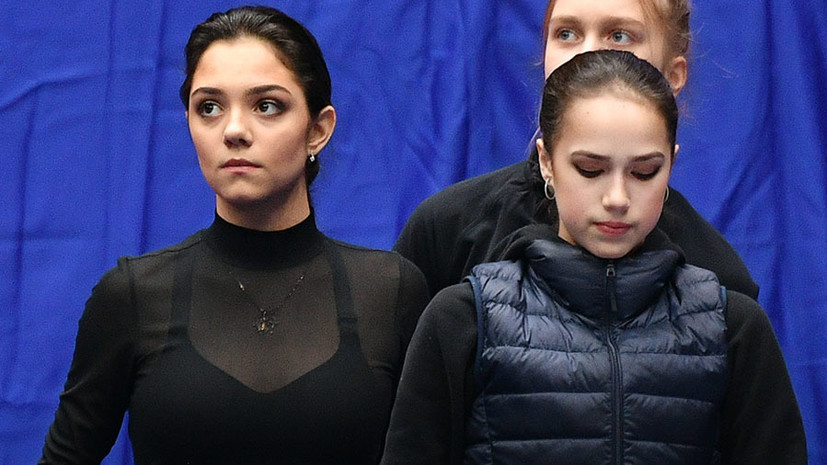The Russian Figure Skating Federation (FFKKR) has published the rules for admission to the most important start of 2020 - the national championship, which will be held from 23 to 27 December in Chelyabinsk. The selection process for the competition has changed significantly compared to previous years and can affect the balance of power in Russian figure skating.
Fans of this sport are well aware that earlier figure skaters who performed in the Grand Prix series and in the final of the ISU Junior Grand Prix automatically became participants in the Russian Championship. The remaining places were distributed among the best athletes based on the results of five stages of the Russian Cup. However, now these criteria simply cannot work, since due to the coronavirus pandemic, the junior Grand Prix series had to be completely canceled, and the adult competitions have undergone significant changes.
Now the executive committee of the FFKKR has decided that qualification for the Russian championship will be carried out only based on the results of the country's Cup. To go to Chelyabinsk and compete for a place in the national team, skaters need to perform at least two stages and score as many points as possible for the occupied places. In past years, no more than 18 singles, 15 dance duets and 12 sports couples could take part in the Russian championship.
The qualifying requirements for the main national start have become much stricter. The principles adopted by the FFKKR do not imply any exceptions when forming the list of participants. The main stars of figure skating will have to participate in the stages of the Russian Cup in the fall, and missing one of them due to injury, illness or a broken skate may leave an athlete without international tournaments in the second half of the season.
The loss of armor for Grand Prix participants will be especially sensitive for skaters who train with foreign coaches. For example, it will not be easy for Evgenia Medvedeva in the current conditions to persuade her mentor Brian Orser to come to Russia twice and accompany her at tournaments. The Canadian specialist works with athletes from different countries, and usually he accompanies them only at the stages of the Grand Prix. In 2018, Medvedeva almost found herself in a similar situation at the Russian championship, but then Orser still came to her in Saransk when Yuzuru Khanya was injured.
The Russian Cup in the new season will include five stages. The first will take place in Syzran from 18 to 22 September. Starts in Moscow and Sochi are scheduled for October. The fourth stage in November will be hosted by Kazan, and the final tickets to the Russian championship will be distributed after another tournament in the capital, which will be held from 5 to 8 December, two weeks before the competition in Chelyabinsk.
The calendar of the Russian Cup approved by the FFKKR does not correspond to the schedule of international competitions and Grand Prix stages adopted by the International Skating Union (ISU). For example, the final tournament in Beijing is scheduled for December 10-13, and the Russians who qualify for it (if the ISU approves the selection rules for it at all) will most likely have to make a choice in favor of home competitions, unless an exception is made for them. Some stages of the Russian Cup were superimposed on foreign pre-season starts and stages of the Grand Prix, so that domestic figure skaters are unlikely to be able to participate in them either.
When qualifying for the Russian championship, the distribution of participants in the Cup stages will be of great importance, so that their level is approximately the same everywhere. The FFKKR decided that this issue will be resolved in accordance with the ISU regulations for the Grand Prix. Also, the head coach of the Russian national team (which is the president of the federation Alexander Gorshkov), the All-Russian Coaching Council and personal mentors of athletes will also be able to influence the composition of the participants in one or another stage of the Russian Cup through the bureau of the executive committee of the FFKKR.
The basis for the distribution of athletes will be the results of the last Russian championship, which may affect the interests of skaters who missed that tournament. For example, Olympic champion Alina Zagitova, if she resumes her career, will have to compete with far from the easiest rivals, and she will not have any privileges.
Since now the prestige of the Russian Cup will increase dramatically, it can be expected that many athletes will want to compete in it. However, in accordance with the requirements of Rospotrebnadzor, it was decided to reduce the number of participants to 12 singles, 10 dance duets and 8 sports pairs. Usually, the stages of the Russian Cup did not collect so many athletes, but now there will be a struggle between them for only one performance in Syzran, Kazan, Sochi and Moscow.
The fans will undoubtedly benefit from the new selection rules for the Russian Championship. Previously, they could not dream of seeing their idols on the ice somewhere else besides the national team's test skates, one stage of the Grand Prix in Moscow and the Russian championship. And the attention of the fans will benefit the FFKKR, which now has at its disposal five attractive tournaments for sponsors with the main stars of the country.

